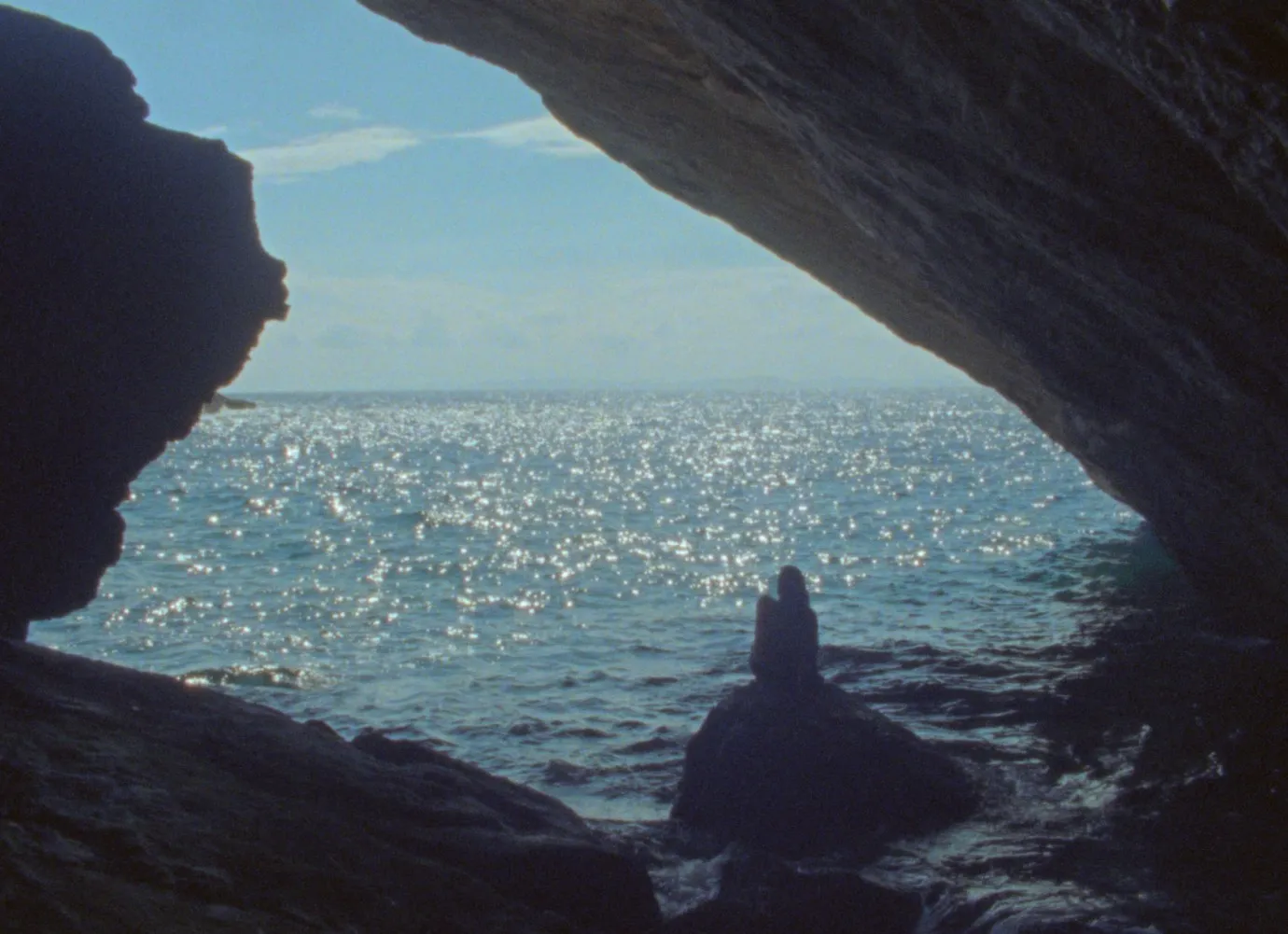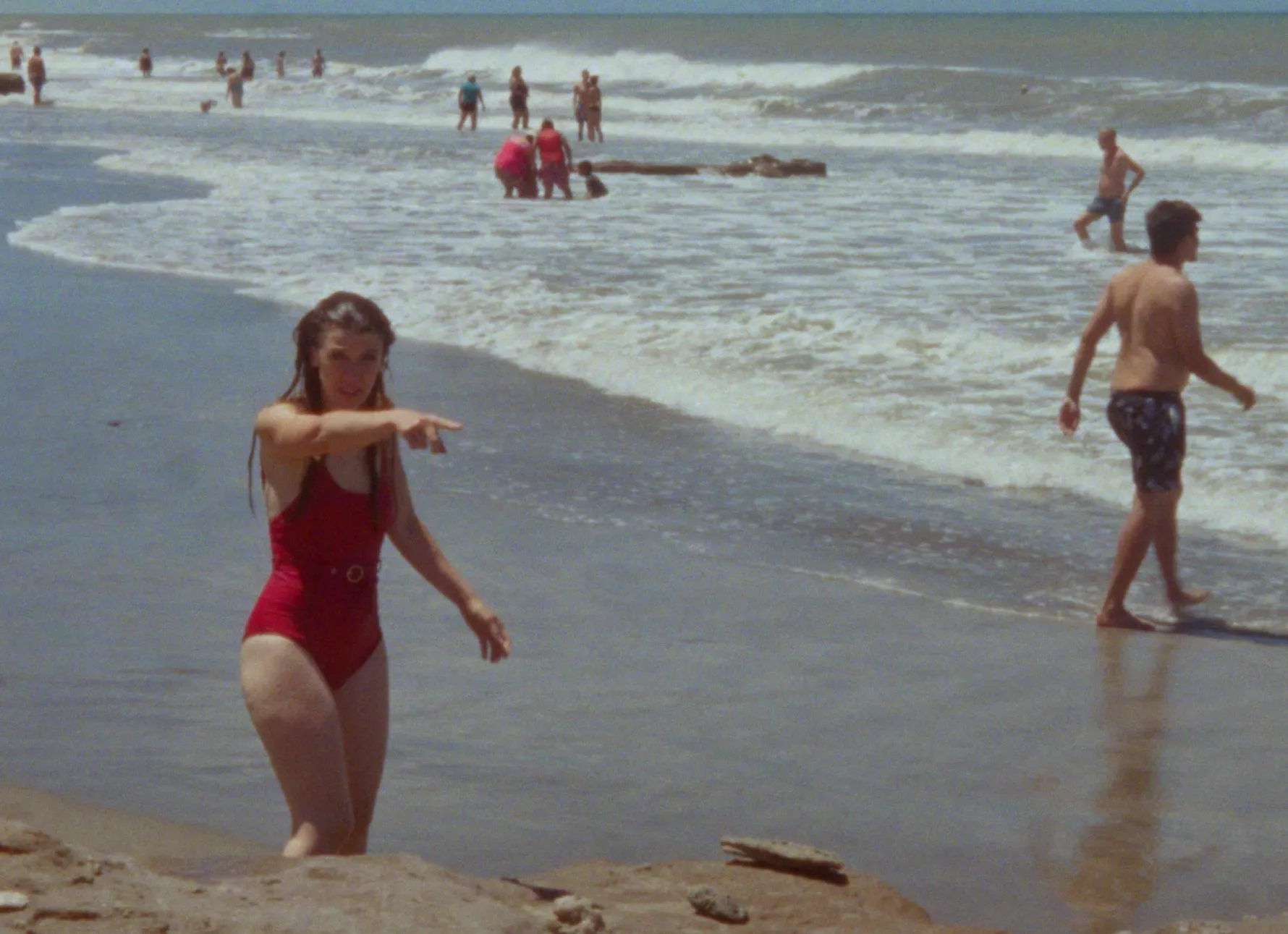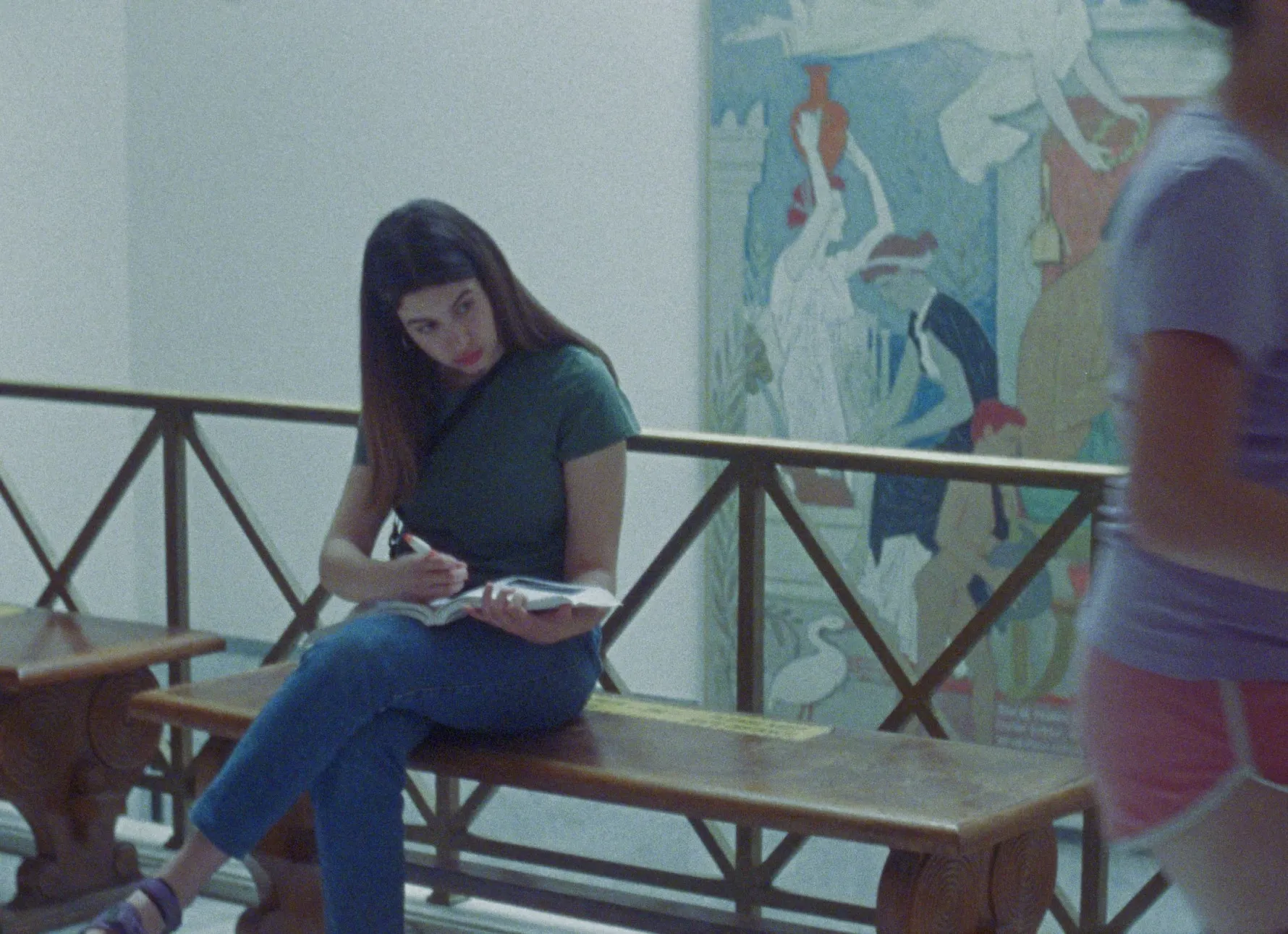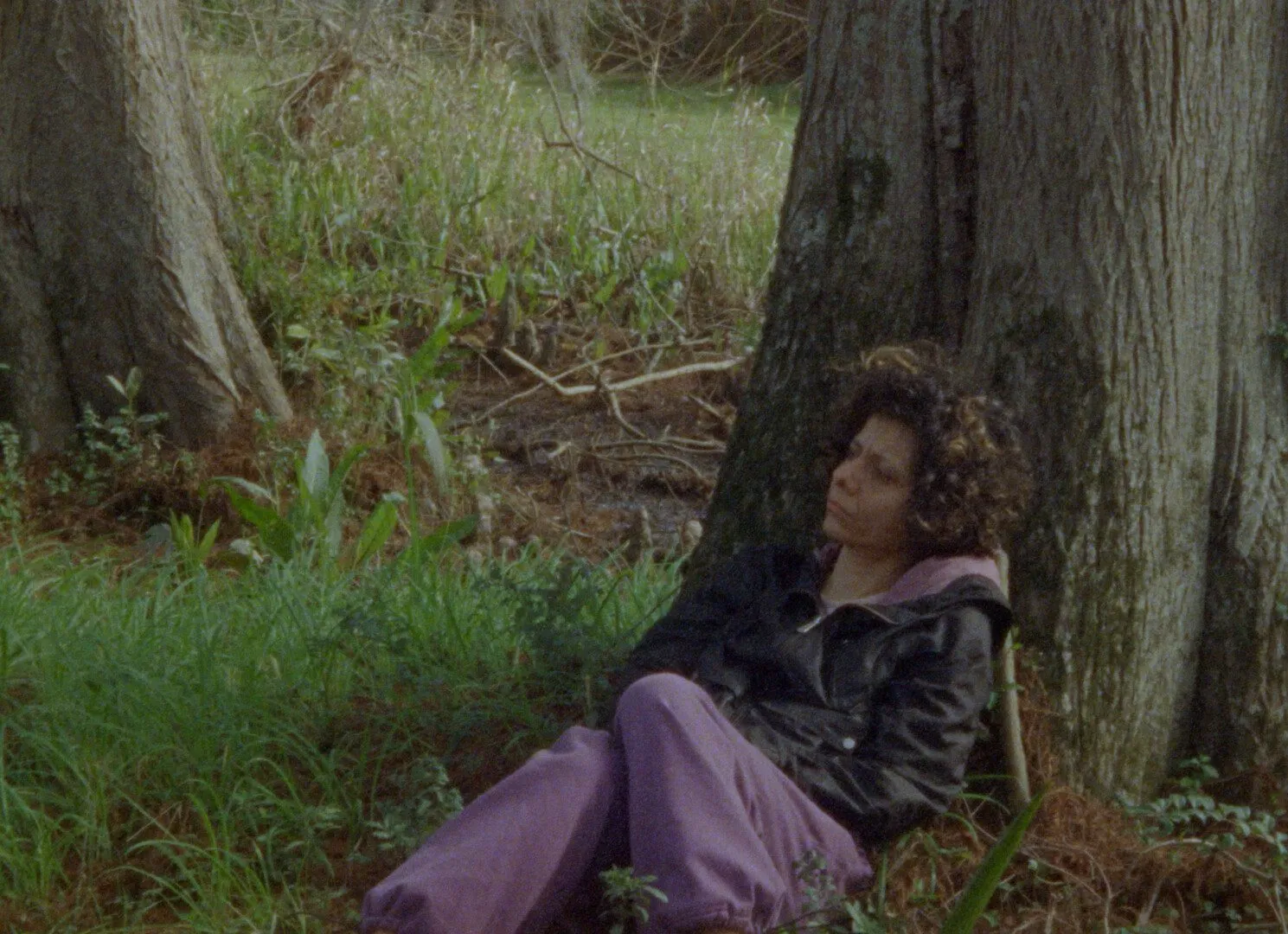Argentine director Matías Piñeiro has long been intrigued by the challenge of adapting literary works for the screen. In his latest film You Burn Me, he finds inspiration in the sparse yet evocative fragments of poetry left to us from ancient Greek lyrical poet Sappho.
Living in the 7th century BC on the island of Lesbos, Sappho wrote verses infused with longing, often focused on themes of love, desire and relationships between women. While the majority of her original writings are lost to time, they cement her place among history’s most significant poets.
Piñeiro’s film grapples with Sappho’s legacy, using her surviving words as a starting point to meditate on life’s biggest mysteries. At the core of You Burn Me is a chapter from Italian author Cesare Pavese’s 1947 book Dialogues with Leucò.
It imagines a conversation between Sappho and the nymph Britomartis atop restless ocean waves, as the two women discuss their own fates and make sense of the human experience. Piñeiro transports this literary dialogue to the present day, casting it through a dreamlike and nonlinear cinematic lens. The result is a transportive voyage that pays homage to great works while finding deeper layers of meaning and connection.
Nonlinear Reflections on Love and Loss
You Burn Me embraces experimental storytelling. Director Matías Piñeiro crafts the film as a series of nonlinear reflections, evoking Sappho’s surviving poetry through a fragmented narrative. Scenes appear momentarily, seemingly at random, before toggling between locations and time periods.
Cinematographer Tomas Paula Marques lends the film a dreamlike elegance with his somber yet mesmerizing 16mm photography. Wafting camera movements immerse us in Piñeiro’s contemplative pace. Scattered amongst dialogue, shots drift through seaside vistas and city streets, inviting reflection on singular details like crashing waves or passersby.
Repetition ties disparate pieces together. Certain images resurface frequently, taking on new layers of meaning within changing contexts. A sense of poetry emerges from Piñeiro’s thoughtful editing, enhancing the story’s lyrical nature. Words and pictures echo one another elusively, communicating abstract concepts through impressionistic form.
Sound also weaves fragments into a cohesive whole. Original music from star Gabi Saidón imbues scenes with emotive underscore, her vocals dotting the score. Agustina Muñoz’s voiceover blends meditations on love and mythology, read from Sappho’s poetry and Pavese’s text. Her intonations wax and wane like tides or heartbeats.
Within this rich sensory framework, Saidón and María Villar lend nuanced performances as Sappho and Britomartis. Through veiled glances and hushed dialogue, the actresses convey passionate depth just beneath surface realities. Their brooding characters serve as vessels for exploring life’s profound mysteries of intimacy, longing and fate’s cruelties.
You Burn Me thrives on subjective experience rather than straightforward exposition. Piñeiro trusts viewers to intuitively grasp recurring themes through oblique, carefully composed pieces that evoke more than explain. In celebrating the mysteries of human experience, he revives Sappho’s fragments for a new era.
Weaving Threads of Time
You Burn Me deftly bridges eras by bringing Classical sources into dynamic conversation with today. At its heart lie two literary works from centuries past – Sappho’s poetic fragments and Cesare Pavese’s Dialogues with Leucò. Through their selective yet thoughtful adaptation, Matías Piñeiro breathes new life into these voices.
Pavese imagined a dialogue between Sappho and Britomartis on the shores of their watery graves. Piñeiro transports this discursive spirit into Lisbon’s streets, where Sappho and Britomartis glimpse their lives refracted across time. Gabi Saidón and María Villar breathe humanity into these figures while maintaining an intimate link with their mythical roots.
Fragmentary as Sappho’s poems, Piñeiro’s nonlinear narrative evokes their spirit. Fluid editing assembles scattered moments into poetic flow, just as her lines reconstruct Sappho’s world from sparse words. Repeated imagery and the score’s vocals echo these ancient tunes for modern ears.
Subtleties also emerge from updating details. WhatsApp exchanges replacing the sea setting acknowledge technology’s influence while staying true to the dialogues’ philosophical intimacy. A voyage across eras becomes one through which all may find reflection.
In studying source texts so deeply, Piñeiro puts them in thoughtful conversation. His adaptation honors their original insights while expanding their realms of significance. New layers emerge from the friction of past and present, preserving history yet challenging its confines.
By this interweaving of threads, You Burn Me ensures these seminal works live on in new incarnations that speak to every age. Piñeiro pulls glimpses of truth from the fragments as deftly as Sappho, suggesting her musings on love and mortality will resonate through time immemorial.
Reflections of the Heart
You Burn Me contemplates timeless themes that occupy so much of the human experience. At its core lie longing, sorrow and passion in all their complexities. Through Sappho’s verses and Pavese’s dialogues, Matías Piñeiro sheds new light on love and mortality.
Both Sappho and Britomartis knew love’s intricacies – its ecstasies but also its potential for ruin. Their stories, real or mythic, speak to loves so powerful they could drive one to death’s embrace. Piñeiro grants these figures a glimpse into how future ages would frame their fates too. Their talk touches on love’s endurance across eras and cultures, outliving even the most complete of lives.
Desire emerges as another thread connecting past to present. Britomartis and Sappho explore longing as a universal force, its grip on mankind undiminished by the passage of centuries. Piñeiro acknowledges this timelessness through imagery lending texture to their reflections. Waves and unfurling pages become canvases on which this perpetual emotion is vividly yet softly depicted.
Perhaps inevitably, their conversation also probes mortality and its relationship with what animates our days. This theme is woven throughout the film in thought-provoking ways, from quiet shots of waters that engulfed these legendary souls to glimpses of the hotel claiming Pavese. Their discussions uncover life’s bittersweet brevity and death’s power to steady passion’s grip.
Through its layered, elegant adaptation, You Burn Me taps into shared aspects of the human heart. Piñeiro ensures Sappho and Pavese’s insights persist by refracting them through a contemporary lens, reminding all people and eras of love, desire and mortality’s profound roles in our shared experience. His film sheds light on the threads connecting inhabitants of all times through reflections on themes eternally etched in our nature.
Refracted Voices from the Past
Matías Piñeiro’s You Burn Me utilizes a fascinating nesting of layers that provide fertile ground for interpretation. At its heart lie the written works of Sappho and Pavese, whose reflections on love and loss we see refracted through a contemporary lens.
Pavese imaginatively placed words in Sappho’s mouth through “Dialogues with Leucò”. Piñeiro brings these figures further into the present, with actors voicing rewritten snippets of their thoughts. Beyond this lie additional shells – the narrator reading excerpts, imagery evoking implications.
Repetition across sequences engenders patterns inviting connections. Yet gaps in visual-verbal alignment challenge easy understanding. Is meaning intended or open? Piñeiro seems reluctant to explain, instead stirring ideas through ambiguity.
His fondness for complexity shows in looping motifs granted new context. Waves and outstretched hands take on narrative weight through recurrence. Texts are probed from varied angles, keeping their insights unfolding.
Challenging preconceptions, Piñeiro moves fluidly between time periods. Intimate scenes sidestep historicizing Sappho as merely a male-dominated legacy. Her words stand independently powerful even through the filters of authors.
You Burn Me resists resolution, resonating through lingering questions. Piñeiro’s refractions breathe fresh life into ancient voices, affirming their continued relevance. Interpretations vary boundlessly as glimpses spark independent thoughts, fittingly reflective of the fragmentary forms that inspired this cinematic mosaic of longing across eras.
Through oblique storytelling, Piñeiro taps nostalgia while cultivating modern eyes. His experiment shows how past and present converse fluidly when we listen for gleams of shared humanity.
The Sounds and Sights of Antiquity
Matías Piñeiro’s You Burn Me strives to capture the essence of Sappho’s lyricism through a singular fusion of visuals and music. Drawing inspiration from the poetic fragments of antiquity, the film crafts a dreamlike experience in which images and sound work in harmony.
Central to the atmospheric undertones are Gabi Saidón’s original compositions. Her subtle acoustic guitar and ethereal vocals drift through scenes, lending a sense of nostalgia. Snippets of landscapes, objects and faces emerge and fade to this melodic backdrop, pieced together like verses in a song.
Repetitions in the score imbue certain shots with symbolic weight and connect abstract notions. Impressionistic rather than narrative, the swirling soundscapes and imagery elicit response on an intuitive level. We absorb poetic implications through sensation as much as rational comprehension.
Piñeiro’s intimate handling of the 16mm film shows an artist’s care in each frame. Scenes portray everyday routines yet hint at deeper currents. Waves collapsing invoke ephemeral beauty and metaphorical truths. Through patience and subtlety, the director evokes antiquity’s essence as lived experience rather than a history lesson.
You Burn Me stirs imagination by kindling half-formed associations rather than explicit explanations. Its success lies in honoring Sappho’s own enigmatic fragments and channeling their lyrical spirit. Viewers emerge enriched not by answers but new perspectives, seeing past linear time through a window into souls ancient yet modern. In form and feeling, Piñeiro achieves the book’s goal – bringing antiquity to life as something intensely intimate, but infinitely unknowable.
Surrender to the Poetry of History
You Burn Me is a film that demands surrender. Surrender to its fragmentary structure and refusal of easy answers. Surrender to an atmosphere that lingers long after viewing. And surrender to how powerful the past remains when gifted new life by an artist’s hands.
Piñeiro has crafted an ode to the timelessness of Sappho, preserving her enigmatic spirit through imagery and sound. Glimpses of faces and places evoke her surviving verses – brief yet indelible. His visual poetry resurrects history as something intimate rather than removed.
The director honors Pavese too by exploring his fascinations and heartbreaks. His adaptation stimulates while frustrating desire for simplistic ties between character and text. Meaning swirls subtly yet stays tantalizingly out of reach.
What’s certain is this film’s ability to stir thought. It peels back surface narratives to contemplate deeper questions underneath – of love and death, creation and memory. The director’s experimental spirit invites unlocking multiple interpretations with each viewing.
You Burn Me asks that we surrender assumptions and immerse ourselves in sensory experience. Rewards come to those open to absorbing atmosphere over strict logic. In surrendering fully, we allow history’s lessons to permeate our present in profound yet mysterious ways. Piñeiro’s triumph lies in how his surrender to poetry inspires the same in viewers, long after the ending credits fade.
The Review
You Burn Me
Matías Piñeiro's You Burn Me is an admirably experimental work that pushes boundaries in form while wrestling with timeless questions. Although ambitious to a fault at moments, the film sustains an intoxicating atmosphere that lingers in the mind. Through impressionistic visuals and sound, it stirs imagination and invites interpretive Surrenders to fragmentary beauty. You Burn Me honours history not by solving its mysteries but resurrecting them as living enigmas. It challenges as much as it stimulates - which may divide audiences. But for those open to slipping past surface into sensual absorption, Piñeiro's adaptation offers rewards of discovery with each viewing.
PROS
- Ambitious experimental form that pushes boundaries
- Intoxicating atmosphere and sensory experience lingers with viewer
- Impressionistic visuals and soundtrack stir imagination
- Honors history by bringing the past to life as something intimate
- Stimulates interpretive thought and rewards repeat viewings
- Challenges assumptions in thoughtful way
CONS
- Fragmentary and ambiguous structure may frustrate some
- Not entirely clear connections between adaptations at times
- Demands openness and surrender from viewers
- Potentially divides audiences depending on tolerance for ambiguity
- Some scenes lack narrative clarity























































Discussion about this post